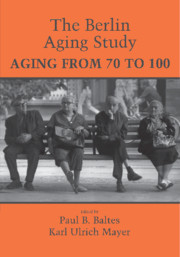Book contents
- Frontmatter
- Contents
- Acknowledgments
- Introduction
- Part A Theoretical Orientations and Methods
- Part B Major Results from the Four Research Units
- Part C Interdisciplinary Findings
- Part D Overview and Outlook
- 18 What Do We Know about Old Age and Aging? Conclusions from the Berlin Aging Study
- Notes on Contributors
- Abbreviations
- Author Index
- Subject Index
18 - What Do We Know about Old Age and Aging? Conclusions from the Berlin Aging Study
Published online by Cambridge University Press: 06 December 2010
- Frontmatter
- Contents
- Acknowledgments
- Introduction
- Part A Theoretical Orientations and Methods
- Part B Major Results from the Four Research Units
- Part C Interdisciplinary Findings
- Part D Overview and Outlook
- 18 What Do We Know about Old Age and Aging? Conclusions from the Berlin Aging Study
- Notes on Contributors
- Abbreviations
- Author Index
- Subject Index
Summary
Introduction
Our central goal in this concluding chapter is to make the presentation of BASE findings accessible to readers from different backgrounds and to elucidate some implications for social policy and application. To this end, a certain degree of overlap in the material presented is unavoidable.
To begin, we address readers with a general interest in aging research. Our aim is to show discrepancies between social expectations of old age and the evidence obtained in the Berlin Aging Study. We employ a format developed by Palmore (1988) in the Facts on Aging Quiz that confronts readers with a list of assertions about old age and aging. Using new questions and BASE findings, we then reveal the “correct” response (see Section 2).
In Section 3, we address specialists in the field of gerontology and summarize important results from each of the four BASE research units. In Section 4, we take a systemic perspective, combine these discipline-specific findings, and examine whether certain groups of older people or patterns of aging can be distinguished. In a sense, the observations offered in Section 4 are the closest we come to a wholistic view of aging, one of the stated primary objectives of BASE.
Finally, in the light of BASE findings, we consider whether current images of old age are too positive or too negative. We also discuss the implications of BASE results in terms of the theoretical conceptions of differential aging, continuity versus discontinuity, and systemic aspects of aging.
Information
- Type
- Chapter
- Information
- The Berlin Aging StudyAging from 70 to 100, pp. 475 - 520Publisher: Cambridge University PressPrint publication year: 1998
